IMDb रेटिंग
6.6/10
5.9 हज़ार
आपकी रेटिंग
हिंदी सिनेमा के सौ सालों और फ़िल्म की ताकत को चार लघु कहानियों के माध्यम से दर्शाया गया है.हिंदी सिनेमा के सौ सालों और फ़िल्म की ताकत को चार लघु कहानियों के माध्यम से दर्शाया गया है.हिंदी सिनेमा के सौ सालों और फ़िल्म की ताकत को चार लघु कहानियों के माध्यम से दर्शाया गया है.
- पुरस्कार
- 4 कुल नामांकन
Priyanka Chopra Jonas
- Self
- (as Priyanka Chopra)
फ़ीचर्ड समीक्षाएं
This rating is only for the last part... Anurag kashyap.
artistic...brilliant...honest...relevant....cinema... Bombay Talkies!! Karan Johar takes up a difficult topic and treatment of the topic and the characters and the scenarios, is all very, lets say, un-karan johar like....refreshingly artistic....the story lacks a closure, but you get to see a very very capable director in the short story!! Dibakar banerjee picks up a good short story, and an outstanding actor in Nawaz, to create his share of magic...Nawaz has again showed why he is easily among the greatest actors ever, anywhere, when it comes to displaying pain on screen...and,if you have ever done theater, you will be tempted to get up and salute this part...
Zoya Akhtar picks up a Katrina Kaif item number out of the forgettable Tees Maar Khan, and still creates a brilliant story out of it...the treatment, like all the other parts, is extremely realistic...and performances, like all parts, brilliant!! After the above brilliant sequences, excellently made, and brilliantly acted, which would make you clap, on several occasions...and smile...and cry..comes up the sequence by Anurag Kashyap....and what better way to prove, that he truly is the king among the film makers today!! The final story, has Anurag Kashyap, at even his best...and you have a relatively unknown face (guy who played Nawaz's brother in GOW), giving an outstanding performance...this part is beyond brilliance...a simple story told and depicted in a masterful manner...its so good that at times, that you may laugh and cry at the same time (actually!) fitting tribute....thank you to the team....respect for Hindi Cinema...respect for Bombay Talkies!!
Zoya Akhtar picks up a Katrina Kaif item number out of the forgettable Tees Maar Khan, and still creates a brilliant story out of it...the treatment, like all the other parts, is extremely realistic...and performances, like all parts, brilliant!! After the above brilliant sequences, excellently made, and brilliantly acted, which would make you clap, on several occasions...and smile...and cry..comes up the sequence by Anurag Kashyap....and what better way to prove, that he truly is the king among the film makers today!! The final story, has Anurag Kashyap, at even his best...and you have a relatively unknown face (guy who played Nawaz's brother in GOW), giving an outstanding performance...this part is beyond brilliance...a simple story told and depicted in a masterful manner...its so good that at times, that you may laugh and cry at the same time (actually!) fitting tribute....thank you to the team....respect for Hindi Cinema...respect for Bombay Talkies!!
"I don't think that writers or painters or filmmakers function because they have something they particularly want to say. They have something that they feel. And they like the art form; they like words, or the smell of paint, or celluloid and photographic images and working with actors. I don't think that any genuine artist has ever been oriented by some didactic point of view, even if he thought he was." – Stanley Kubrick
Much like the American or Italian movie industry, who made movies such as 'Hugo' or 'Nuovo Cinema Paradiso', which celebrates the art of movie making; Bollywood has its 'Bombay Talkies'
Celebrating 100 years of Indian Cinema which was born in1913, we have four directors narrating four short stories in this movie. The stories though being each of a different flavor, has one common theme –how the life of the common man is percolated through movies. A similar themed movie was released few years back, Dev Bengal's 'Road, Movie' also explored the same arena; however, it's best not to compare these two movies at this juncture.
The film opens with Karan Johar's segment. The story explores the hypocrisy and insincerity surrounding homosexuality. The segment delivers itself so perfectly, that one at times wonders that if Karan Johar has wasted himself in cheap commercial ventures for so many years. This is possibly Johar's most serious piece of movie making so far. The metaphorical usage of old songs such as Ajeeb Dastan and Lag Ja Gale, accompanied by sharp witted dialogs makes it a compelling watch. Also, this is the segment where Urban Mumbai is captured very beautifully.
Dibakar Bannerjee's segment is arguably the best segment of the movie. Inspired from Satyajit Roy's 'Potolbabu Film Star', the story revolves around a man from lower middle class, a struggling actor trying very hard to make ends meet, suddenly landing up with a role in a movie. The protagonist portrayed by Nawazuddin Siddique, is one of the most layered characters that one would get to see in Bollywood ventures. Siddique has proved his worth time and again, but this time it is his absolute best. Also, Bannerjee's adaptation of a kid's story and changing the backdrop from the somber Kolkata to the rustic Mumbai is greatly commendable. The final scenes of the story, shows Siddique's profundity as an actor. It also proves that the duo of Dibakar and Nawaz is deadly on screen. Sincerely, hope that they make more movies together.
Zoya Akhtar's story is about a child protecting his dream and the parent's urge to follow conventionalism. Child actor Naman Jain shines a light and so does Ranvir Shorey as a disciplinarian father. The final scenes would remind some of the Hollywood flick 'Little Miss Sunshine' at times. Nonetheless, the story remains very original.
The last story by Anurag Kashyap is about a small towner's journey to Mumbai to meet the legendary Amitabh Bachchan to make him taste a half of 'murabba' as a part of his ailing father's wish. Anurag Kashyap who is usually known to think out of the box, dark gritty storytelling and using vivid imagery, surprises with a story that is so hopelessly positive. The movie is not only about the manic cine fans but also about a lesson learnt in life – of the need of drama in our lives and of the guts to fulfill one's desires. The story resembles the Tom Hanks starrer 'The Terminal' at times but is awfully delightful and makes one hug himself with joy. The performance by Veneet Kumar is top notch.
Bombay Talkies not only marks the 100 years of Indian Cinema, it also marks the coming of age of bollywood. For an industry which have only a handful of directors focusing on art house cinema so far – that too mostly on independent banners; this movie is surely a benchmark which prods a truly ensemble cast and a tout ensemble directors that earmarks this industry into manhood.
Much like the American or Italian movie industry, who made movies such as 'Hugo' or 'Nuovo Cinema Paradiso', which celebrates the art of movie making; Bollywood has its 'Bombay Talkies'
Celebrating 100 years of Indian Cinema which was born in1913, we have four directors narrating four short stories in this movie. The stories though being each of a different flavor, has one common theme –how the life of the common man is percolated through movies. A similar themed movie was released few years back, Dev Bengal's 'Road, Movie' also explored the same arena; however, it's best not to compare these two movies at this juncture.
The film opens with Karan Johar's segment. The story explores the hypocrisy and insincerity surrounding homosexuality. The segment delivers itself so perfectly, that one at times wonders that if Karan Johar has wasted himself in cheap commercial ventures for so many years. This is possibly Johar's most serious piece of movie making so far. The metaphorical usage of old songs such as Ajeeb Dastan and Lag Ja Gale, accompanied by sharp witted dialogs makes it a compelling watch. Also, this is the segment where Urban Mumbai is captured very beautifully.
Dibakar Bannerjee's segment is arguably the best segment of the movie. Inspired from Satyajit Roy's 'Potolbabu Film Star', the story revolves around a man from lower middle class, a struggling actor trying very hard to make ends meet, suddenly landing up with a role in a movie. The protagonist portrayed by Nawazuddin Siddique, is one of the most layered characters that one would get to see in Bollywood ventures. Siddique has proved his worth time and again, but this time it is his absolute best. Also, Bannerjee's adaptation of a kid's story and changing the backdrop from the somber Kolkata to the rustic Mumbai is greatly commendable. The final scenes of the story, shows Siddique's profundity as an actor. It also proves that the duo of Dibakar and Nawaz is deadly on screen. Sincerely, hope that they make more movies together.
Zoya Akhtar's story is about a child protecting his dream and the parent's urge to follow conventionalism. Child actor Naman Jain shines a light and so does Ranvir Shorey as a disciplinarian father. The final scenes would remind some of the Hollywood flick 'Little Miss Sunshine' at times. Nonetheless, the story remains very original.
The last story by Anurag Kashyap is about a small towner's journey to Mumbai to meet the legendary Amitabh Bachchan to make him taste a half of 'murabba' as a part of his ailing father's wish. Anurag Kashyap who is usually known to think out of the box, dark gritty storytelling and using vivid imagery, surprises with a story that is so hopelessly positive. The movie is not only about the manic cine fans but also about a lesson learnt in life – of the need of drama in our lives and of the guts to fulfill one's desires. The story resembles the Tom Hanks starrer 'The Terminal' at times but is awfully delightful and makes one hug himself with joy. The performance by Veneet Kumar is top notch.
Bombay Talkies not only marks the 100 years of Indian Cinema, it also marks the coming of age of bollywood. For an industry which have only a handful of directors focusing on art house cinema so far – that too mostly on independent banners; this movie is surely a benchmark which prods a truly ensemble cast and a tout ensemble directors that earmarks this industry into manhood.
First off - This movie is not for everyone. Walking out of the hall, I could overhear conversations along the line of, "I thought this was supposed to be good?"
In short, if you like movies from directors such as Vishal Bhardwaj, Anurag Kashyap, Dibankar Banerjee and the likes - you will love this film. If you are into mainstream bollywood, you will hate it.
Also, although the movie is rated U/A, I would strongly advise you not to take your kids along. The first line of the movie is "I am gay, not a eunuch!". This was enough for the people with kids to stand up and leave. And anyway, this is not a movie for kids.
Coming to the four films, #1 Karan Johar - Trash. Most of the reviews I read seemed to like Karan Johar's film, but I really didn't see the point. The film had little to do with Indian Cinema. People seem impressed with the fact that it's bold. It was bold, but forcefully so. As if Johar was trying very hard to be mature. The result was that the film seemed unrealistic and over the top with sexual references and jokes.
#2 Dibakar Bannerjee - My Favorite. A failed actor (Nawazuddin Siddiqui) who gets roped in to a movie shoot. Beautifully done, and Siddiqui was brilliant as always. You feel emotionally attached to the character. I teared up. I am willing to watch this one over and over again.
#3 Zoya Akhtar - Cute. A little boy who wants to be Sheila from 'Sheila ki Jawaani'. Nicely portrayed. The direction seemed novice though.
#4 Anurag Kashyap - Oh! the irony. This one depended more on the storyline than on the screenplay like the others. I had high expectations from Kashyap and he did not fail me. It's a brilliant story and you will find yourself rooting for the character as he tries hard to meet Amitabh Bachchan.
Overall, this is my opinion,
The Best - Dibakar Bannerjee Also good - Anurag Kashyap OK - Karan Johar Not too great - Zoya Akhtar.
In short, if you like movies from directors such as Vishal Bhardwaj, Anurag Kashyap, Dibankar Banerjee and the likes - you will love this film. If you are into mainstream bollywood, you will hate it.
Also, although the movie is rated U/A, I would strongly advise you not to take your kids along. The first line of the movie is "I am gay, not a eunuch!". This was enough for the people with kids to stand up and leave. And anyway, this is not a movie for kids.
Coming to the four films, #1 Karan Johar - Trash. Most of the reviews I read seemed to like Karan Johar's film, but I really didn't see the point. The film had little to do with Indian Cinema. People seem impressed with the fact that it's bold. It was bold, but forcefully so. As if Johar was trying very hard to be mature. The result was that the film seemed unrealistic and over the top with sexual references and jokes.
#2 Dibakar Bannerjee - My Favorite. A failed actor (Nawazuddin Siddiqui) who gets roped in to a movie shoot. Beautifully done, and Siddiqui was brilliant as always. You feel emotionally attached to the character. I teared up. I am willing to watch this one over and over again.
#3 Zoya Akhtar - Cute. A little boy who wants to be Sheila from 'Sheila ki Jawaani'. Nicely portrayed. The direction seemed novice though.
#4 Anurag Kashyap - Oh! the irony. This one depended more on the storyline than on the screenplay like the others. I had high expectations from Kashyap and he did not fail me. It's a brilliant story and you will find yourself rooting for the character as he tries hard to meet Amitabh Bachchan.
Overall, this is my opinion,
The Best - Dibakar Bannerjee Also good - Anurag Kashyap OK - Karan Johar Not too great - Zoya Akhtar.
Director Dibakar Banerjee is keener in establishing the little world his characters, both major and minor, inhabit. You are far more enthusiastic and involved with these people because Banerjee knits together the entire fabric of his creation rather than simply weaving the design; he allows his camera to capture the sight, the sound and the essence of his world and you are respond and reciprocate it to it more than you would to works by other directors. He is one of the best new Indian directors I have seen whose films have gotten far less credit than they deserve. Everyone talks about Karan Johar's or Anurag Kashyap's involvement and only a few (which includes me) may've gone for Bombay Talkies to watch out for Dibakar Banerjee. His segment is called Star and it comes right after Johar's opening segment; Banerjee's work simply blows the other segments out of water, and only Kashyap's Murabba is able to escape uninjured. But poor Zoya Akhtar's segment Sheila Ki Jawaani isn't very lucky, barely holding up to the standards of Banerjee's work. And Johar's hokey gay-themed segment seems flaccid in comparison.
I don't mean by saying all this that you should skip the other segments and only catch Banerjee's; Bombay Talkies is a far better offering than most other Indian movies you might catch in theaters. It's got a limited release and has managed to rake in mediocre box-office collections, but it surely deserves to be recognized for being novel not just for the sake of being novel. Four different directors with quite different styles and palettes put up their works for an anthology film and you as an audience member have a lot more to discuss here than just the quality of the film itself: you compare these filmmakers' works and form your own preferences. I loved Banerjee's work but I hear many other praising Karan Johar more, but you see what's happening here is that everyone's talking a lot more about the film than they usually would. For this alone people should catch Bombay Talkies before it exits theaters with its final salute to Bollywood.
Bombay Talkies, named after a prestigious movie studio of the same name which opened in the 30s and has closed down now, is a cinematic ode to celebrate the hundredth anniversary of Bollywood. This ode is sung by four directors: 1) Karan Johar, known for his epic-length melodramas with names usually beginning with letter 'K', 2) Dibakar Banerjee, a superbly talented director whose works evoke the multiplicities seen in Neorealist films 3) Zoya Akhtar, who has won a couple of awards in India and comes from a family of talented actors, musicians and lyricists and 4) Anurag Kashyap, whose works have been screened at Cannes. While Johar and Akhtar share this style of directing that many of the filmmakers who've been brought up in this industry from the start possess, Kashyap and Banerjee inject the flavor of world cinema into commercial Bollywood.
Johar begins first, his film being about Avinash, a lonely gay man estranged from his family who meets a lonely married straight woman whose sex life (with her husband, of course. Infidelity not usually tackled in Indian films) is sterile. There's the husband who is dull and lonely (and completely not aroused by his wife) and loves old Hindi songs, and things get complicated when Avinash meets the husband and his gay sensor tingles. You perfectly know what's going to happen next. Once Johar's done, its Banerjee's turn: his film is about a lower-middle class Maharashtrian (Nawazuddin Siddique, awards coming your way) whose many little ambitions, which includes breeding Emus, have never taken flight until the moment he gets the golden opportunity to share the screen space with megastar Ranbir Kapoor one day. If Banerjee makes us hate the theater owners for keeping an interval for the film, Zoya Akhtar's segment post-intermission about a little kid who hates football and likes dressing up like a girl and who idolizes actress Katrina Kaif makes us hate the film's editor for not including more of Dibakar's story. The final segment is a little queer and quirky, and it's by Kashyap; his film is about Vijay, an Allahabad native who, under his ailing father's insistence, travels to Bombay to offer the King of Bollywood half of a Murabba, a jam pickle, so that the other half, once blessed with Bachchan's uhm teeth could be consumed by Vijay's father to get well.
Johar's segment is simple are quite predictable; you are well aware what's going to happen and because it's a Johar film, you know there'll be a lot of tears shed by the characters. Apart from its hokey and hackneyed theme, I really wasn't sure whether it portrayed gays in a flattering light. Akhtar on the other hand makes a film full of annoyingly precocious children and one-dimensional characters, especially the kid's father who keeps repeating 'Football is a guy's game. Football will make you strong'. Anurag Kashyap's 'Murabba' is delicious and delightful, but not anywhere close to the richness of Banerjee's offering. There's so much to enjoy, so many little things that we watch happening in Banerjee's film, and he's a pro when it comes to handling his camera and sound. There's a common theme of father-son relationship running in all four shorts.
There's a music video after the shorts which celebrates the hundred years of Bollywood, and they've added a montage that shows Bollywood through the period. Towards the end, stars like Aamir Khan turn up but I was sadly disappointed by the presence of some actors like Sonam Kapoor here, which shows just how retarded Bollywood has become. Why couldn't they let Nawazuddin sing? Or Kalki Koechlin? When your entire film is about celebrating the true stars, why ruin the moment by bringing in the hundred crore club whose films are strapped on stars and short on sense?
I don't mean by saying all this that you should skip the other segments and only catch Banerjee's; Bombay Talkies is a far better offering than most other Indian movies you might catch in theaters. It's got a limited release and has managed to rake in mediocre box-office collections, but it surely deserves to be recognized for being novel not just for the sake of being novel. Four different directors with quite different styles and palettes put up their works for an anthology film and you as an audience member have a lot more to discuss here than just the quality of the film itself: you compare these filmmakers' works and form your own preferences. I loved Banerjee's work but I hear many other praising Karan Johar more, but you see what's happening here is that everyone's talking a lot more about the film than they usually would. For this alone people should catch Bombay Talkies before it exits theaters with its final salute to Bollywood.
Bombay Talkies, named after a prestigious movie studio of the same name which opened in the 30s and has closed down now, is a cinematic ode to celebrate the hundredth anniversary of Bollywood. This ode is sung by four directors: 1) Karan Johar, known for his epic-length melodramas with names usually beginning with letter 'K', 2) Dibakar Banerjee, a superbly talented director whose works evoke the multiplicities seen in Neorealist films 3) Zoya Akhtar, who has won a couple of awards in India and comes from a family of talented actors, musicians and lyricists and 4) Anurag Kashyap, whose works have been screened at Cannes. While Johar and Akhtar share this style of directing that many of the filmmakers who've been brought up in this industry from the start possess, Kashyap and Banerjee inject the flavor of world cinema into commercial Bollywood.
Johar begins first, his film being about Avinash, a lonely gay man estranged from his family who meets a lonely married straight woman whose sex life (with her husband, of course. Infidelity not usually tackled in Indian films) is sterile. There's the husband who is dull and lonely (and completely not aroused by his wife) and loves old Hindi songs, and things get complicated when Avinash meets the husband and his gay sensor tingles. You perfectly know what's going to happen next. Once Johar's done, its Banerjee's turn: his film is about a lower-middle class Maharashtrian (Nawazuddin Siddique, awards coming your way) whose many little ambitions, which includes breeding Emus, have never taken flight until the moment he gets the golden opportunity to share the screen space with megastar Ranbir Kapoor one day. If Banerjee makes us hate the theater owners for keeping an interval for the film, Zoya Akhtar's segment post-intermission about a little kid who hates football and likes dressing up like a girl and who idolizes actress Katrina Kaif makes us hate the film's editor for not including more of Dibakar's story. The final segment is a little queer and quirky, and it's by Kashyap; his film is about Vijay, an Allahabad native who, under his ailing father's insistence, travels to Bombay to offer the King of Bollywood half of a Murabba, a jam pickle, so that the other half, once blessed with Bachchan's uhm teeth could be consumed by Vijay's father to get well.
Johar's segment is simple are quite predictable; you are well aware what's going to happen and because it's a Johar film, you know there'll be a lot of tears shed by the characters. Apart from its hokey and hackneyed theme, I really wasn't sure whether it portrayed gays in a flattering light. Akhtar on the other hand makes a film full of annoyingly precocious children and one-dimensional characters, especially the kid's father who keeps repeating 'Football is a guy's game. Football will make you strong'. Anurag Kashyap's 'Murabba' is delicious and delightful, but not anywhere close to the richness of Banerjee's offering. There's so much to enjoy, so many little things that we watch happening in Banerjee's film, and he's a pro when it comes to handling his camera and sound. There's a common theme of father-son relationship running in all four shorts.
There's a music video after the shorts which celebrates the hundred years of Bollywood, and they've added a montage that shows Bollywood through the period. Towards the end, stars like Aamir Khan turn up but I was sadly disappointed by the presence of some actors like Sonam Kapoor here, which shows just how retarded Bollywood has become. Why couldn't they let Nawazuddin sing? Or Kalki Koechlin? When your entire film is about celebrating the true stars, why ruin the moment by bringing in the hundred crore club whose films are strapped on stars and short on sense?
क्या आपको पता है
- ट्रिवियाPart one of the three (as of 2020) part series directed by the directors: Karan Johar, Anurag Kashyap, Dibakar Banerjee, and Zoya Akhtar. Others being Lust Stories (2019) and Ghost Series (2020).
- गूफ़In the Murabba story, when Vineet Kumar(Vijay) is talking to the Omelette guy, his lips move for a full sentence but only half of the sentence is audible in the vocal playback.
टॉप पसंद
रेटिंग देने के लिए साइन-इन करें और वैयक्तिकृत सुझावों के लिए वॉचलिस्ट करें
- How long is Bombay Talkies?Alexa द्वारा संचालित
विवरण
बॉक्स ऑफ़िस
- बजट
- ₹6,00,00,000(अनुमानित)
- दुनिया भर में सकल
- $17,89,657
- चलने की अवधि2 घंटे 7 मिनट
- रंग
इस पेज में योगदान दें
किसी बदलाव का सुझाव दें या अनुपलब्ध कॉन्टेंट जोड़ें


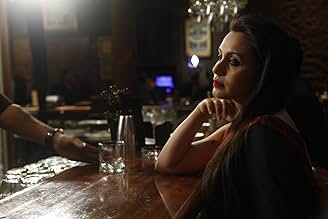

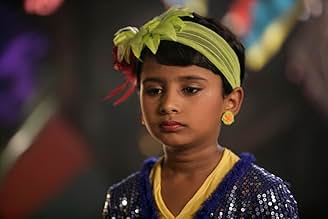
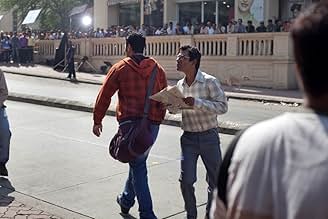
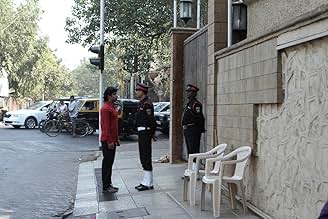
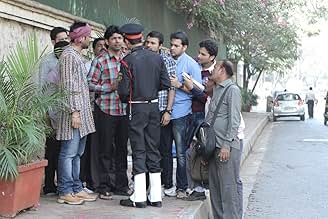
























![Peepli [Live]](https://m.media-amazon.com/images/M/MV5BNDc1YTEwYmUtYTIxMC00Mjg4LWJmODctNGNiYjNjMTA3NjY5XkEyXkFqcGc@._V1_QL75_UY207_CR2)



